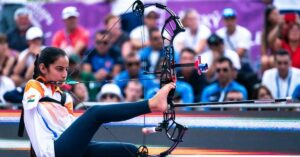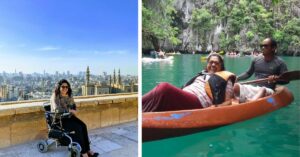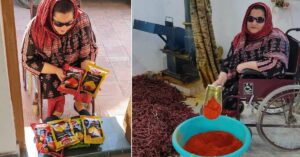5 Times Cheaper Than Imports, IIT-M’s ‘Kadam’ Helps Amputees Walk Comfortably
Researchers at IIT-Madras have launched India’s first indigenous Polycentric Prosthetic Knee, which aims to improve the quality of life for thousands of above-knee amputees.
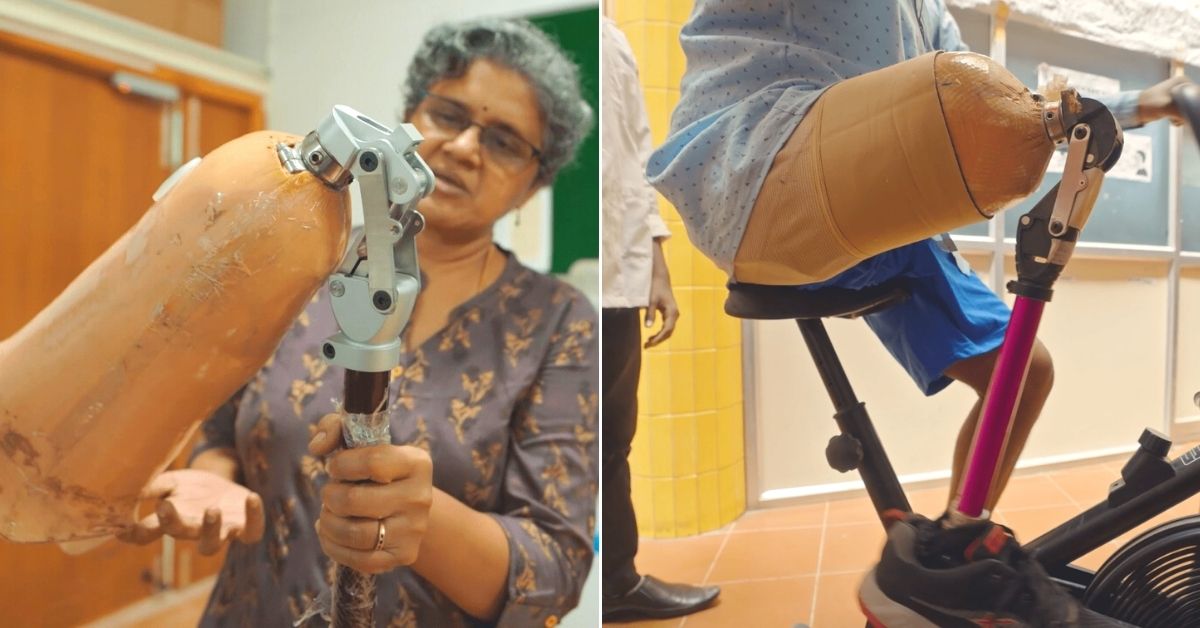
On 8 April 2022, researchers at the Indian Institute of Technology Madras launched India’s first indigenously developed Polycentric Prosthetic Knee called ‘Kadam’ (meaning ‘step’ in Hindi).
To improve the quality of life for thousands of above-knee amputees, this ‘Made-in-India’ polycentric knee for Above Knee Prosthesis was developed by the TTK Center for Rehabilitation Research and Device Development (R2D2) at IIT-Madras in association with the Society for Biomedical Technology (SBMT) and Mobility India.
SBMT, which supported the development process, was set up under Defence Research and Development Organisation (DRDO) by former President Dr APJ Abdul Kalam to enable indigenous medical device development. Meanwhile, Mobility India, a Bengaluru-based non-profit, will look to mass manufacture Kadam and bring it into the market, along with overseeing the processes of fitment, training and ensuring easy access for the users.
What Kadam does is help above-knee amputees to walk with a comfortable gait. It’s not just merely about mobility, but also about improving the users’ quality of life through greater participation in their local communities, access to education, livelihood opportunities, etc.
A press release issued by IIT-Madras notes, “Kadam has advantages over a hinge joint because of the multiple axes of rotation and is specifically optimized to provide the user greater control over the prosthesis while walking, and a maximum knee flexion of 160 degrees to make it easy to sit in cramped spaces like buses and autos. It is designed for durability with high strength stainless steel and aluminium alloy along with hard chrome plated EN8 pins and high fatigue life polymer bushings.”
Kadam marks the fourth assistive device that R2D2 has designed, developed and commercialised for people with movement impairments following ‘Arise’, India’s first standing wheelchair, NeoFly, an active wheelchair and NeoBolt, a motorised add-on for NeoFly to provide seamless indoor-outdoor mobility.
R2D2 engineers user-centric affordable products for the rehabilitation and assistive device needs in India and beyond, working with clinical specialists, non-profit organisations, and hospitals, among others, to field-test the designs. It also fosters a research environment to evaluate assistive device designs from biomechanical and functional standpoints.
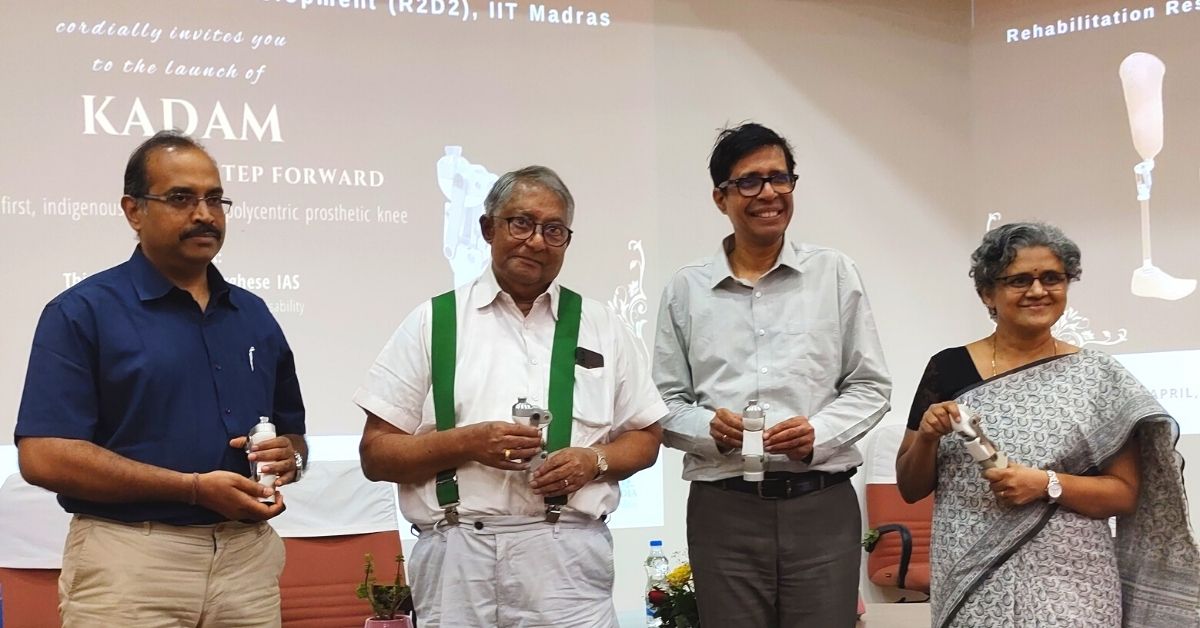
For Indian Conditions
Speaking to The Better India, Prof Sujatha Srinivasan, Head, R2D2, explains the motivation behind creating Kadam.
“We have been working on wheelchair mobility for quite a while now and have launched a couple of devices in this area. Having worked in the prosthetics industry in the United States prior to joining IIT Madras, it was evident to me that developing a prosthetic knee would help thousands of persons with above-knee amputation, especially for use on Indian terrain. The existing knees in India were predominantly locked knees not providing your typical knee joint movement. There are many imported polycentric or ‘four-bar’ knees. Our research showed that four-bar knees are all not functionally equal and so we used optimisation, simulations and user feedback to create a unique geometry that is more suitable for Indian users’ needs. That is why we called it Kadam, a step ahead,” she says.
Kadam is affordable and of high quality and performance, complying with ISO 10328 standards including 30 lakh cycles of fatigue testing. It provides stability, reduces the risk of stumbling and its patented geometry is specifically optimised for use on uneven terrains.
“Through Mobility India, extensive clinical trials have been conducted in various geographical settings–urban, peri-urban and rural. Feedback from these trials has ensured that the design is user-centric and functional in different environments,” notes the release.
Users instantly recognise the stable nature of the knee. “Their ability to let go of the safety of parallel bars in the very first trial is a testimony to the performance of the knee,” adds Prof Sujatha.
Here are some of the unique aspects of Kadam:
- Suitable for short/long residual limbs after transfemoral (above-knee) amputation.
- Polycentric 4-bar knee joint provides the user better control of flexion-extension: “This means easy control of folding and straightening of the knee joint, which in turn helps for extra stability and comfortable walking,” explains Prof Sujatha.
- Customizable stability adjustment depending on the user’s need: “The joint offers three different positions to fix with the socket, which houses the thigh of the user. The position of this attachment is customisable to the user’s stability needs based on their remaining muscle strength, length of the residual limb, etc.,” she says.
- Frictional swing control adjustment for different walking speeds: “Of the 4 bars, rotation of one bar is frictionally controlled and this can be customised to the individual’s self-selected walking speed, which results in a comfortable gait,” she notes.
- Patented 4-bar geometry (Indian Patent No. 338006) provides stability even on uneven terrain, and improved ground clearance: “Ground clearance is what is necessary for the user to swing the limb through without stumbling. Our research has shown that a Kadam user can achieve the necessary ground clearance with low effort. We have tested Kadam in rural, peri-urban and urban settings with users walking on ramps, sand, gravel, steps, etc. and have found it to be stable,” claims Prof Sujatha.
- In addition, Kadam provides maximum knee flexion of over 160 degrees (range limited by socket) and its development witnessed multi-centric user testing with users walking on different surfaces and steep slopes.
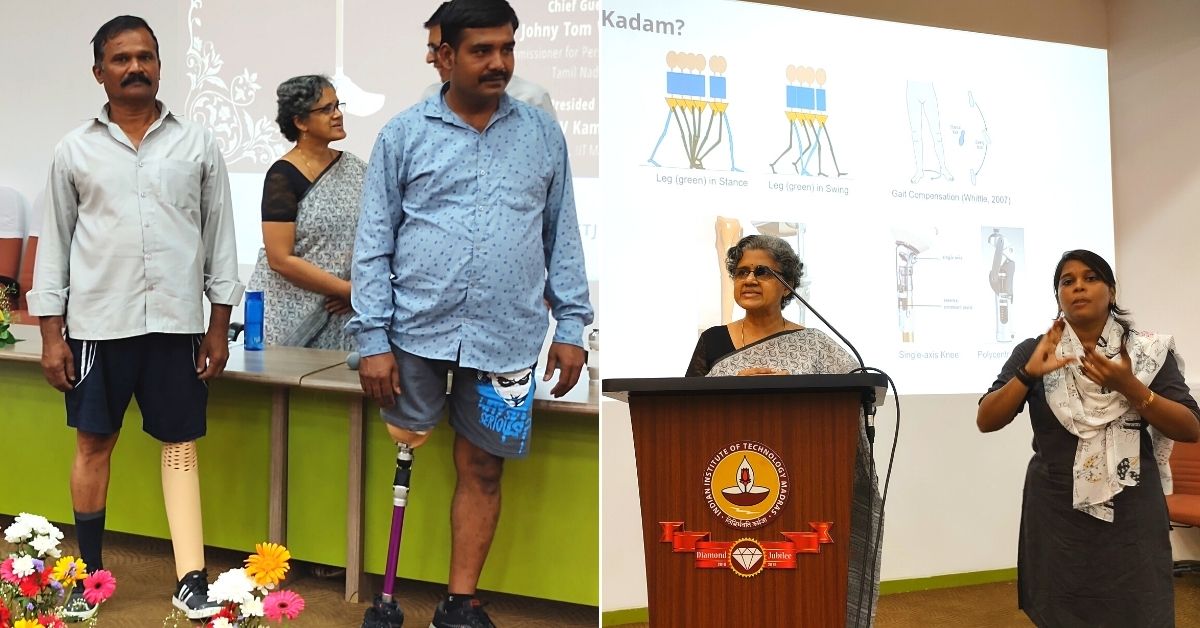
Right: Prof. Sujatha Srinivasan (L), Head, TTK Center for Rehabilitation Research & Device Development, IIT-M, addressing launch event
Affordable & Accessible Tech
According to the World Health Organization (WHO), only 1 in 10 people in need have access to assistive technology and they are not available in adequate numbers and at affordable prices. R2D2 at IIT Madras, headed by Prof Sujatha Srinivasan, has been working to fill that gap.
Speaking to the press at the launch of Kadam, Johny Tom Varghese (IAS), State Commissioner for Persons with Disability, Government of Tamil Nadu, said, “What bridges the world of a Differently Abled Person with that of others is technology. It is phenomenal to see how technology can usher in inclusion in all walks of life. Kadam is one such innovation, along with other similarly path-breaking products that came out of R2D2 IIT Madras, which will make technology accessible and affordable!”
“Functional needs, socioeconomic and environmental challenges of Indian users are unique. Kadam’s user-centric design takes these into account. It meets international quality standards while being 4-5 times more affordable than comparable imported knees,” says Prof. Sujatha.
“While the knee [Kadam] alone would cost between Rs 10,000 to Rs 12,000, even an ISO standards compatible single-axis imported knee typically costs upwards of Rs 50,000. The technology has been transferred to Mobility India and they are working on mass production, looking to make the knee available for sale from the end of May 2022,” she adds.
Congratulating the researchers, Prof V Kamakoti, Director of IIT Madras, said, “The need for technology to meet health and medicine is crucial for a healthy future. Kadam is yet another example to justify this need. We, at IIT Madras, are very happy that our research and development efforts are translating to products that could be of benefit to mankind.”
(Edited by Yoshita Rao)
Like this story? Or have something to share? Write to us: [email protected], or connect with us on Facebook and Twitter.
This story made me
- 97
- 121
- 89
- 167
Tell Us More
We bring stories straight from the heart of India, to inspire millions and create a wave of impact. Our positive movement is growing bigger everyday, and we would love for you to join it.
Please contribute whatever you can, every little penny helps our team in bringing you more stories that support dreams and spread hope.






